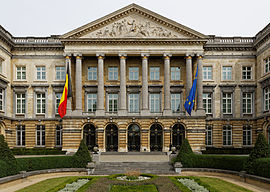Senate (Belgium)
It is a chamber of the communities and regions and serves as a platform for discussion and reflection about matters between these federated entities.The Senate today plays a minor role in the federal legislative process.The Senate was seen as a more conservative and elite body that served as a counterweight to the more progressive Chamber of representatives.For the Senate, candidates still needed to pay ground taxes, but the threshold was lowered.[2] After World War II, women received the same rights as men as far as voting was concerned.These seats are distributed proportionally between parties based on the results of the latest direct election of the Chamber of Representatives (federal level).It was intended to allow the senators to elect a number of experts or members of representative organizations to join them to enhance the quality of debate and legislation; however, political parties sometimes use it as a means of rewarding loyal members that were not elected.[3] The fourth state reform, which took place in 1993, revised the Belgian Constitution, reduced the number of senators to 71.These numbers were in the Belgian Constitution and roughly reflect the ratio of Dutch-speakers to French-speakers by population.Before the sixth state reform, the children of the King, older than 18, or if there were none, the Belgian descendants of the main branch of the royal house, were entitled to be senators by right by taking the oath of office.A senator can only enter into office after having taken the constitutional oath, in either of the three official languages in Belgium: Dutch, French or German.(Dutch: Ik zweer de Grondwet na te leven, French: Je jure d'observer la Constitution, German: Ich schwöre, die Verfassung zu befolgen) Certain offices are incompatible with the office of senator.The Bureau determines the legislative agenda and the order of business in the plenary assembly and the committees, and manages the internal affairs of the Senate.A member of the Federal Government is usually invited to attend the discussions about the legislative agenda.Subsidiarity: Following the EU Treaties, the Senate has the right as chamber of the federal parliament to ensure that the European Union does not take an initiative on an issue that is better dealt with at another level.Before a dossier or topic for debate is dealt with in plenary, it is prepared in one of the committees of the Senate.




FrenchGermanUpper housePresidentVincent BlondelGovernmentVooruitPVDA-PTBOpen VLDVoting systemIndirect election9 June 2024bicameralFederal ParliamentBelgiumChamber of Representatives2014 electionsco-optedPolitics of BelgiumConstitutionTaxationConstitutional CourtMonarchyMonarchPhilippeDuchess of BrabantElisabeth of BelgiumCrown CouncilRoyal FamilyStephanie D'HoseEliane TillieuxFederal CabinetDe Croo GovernmentPrime MinisterAlexander De CrooJudiciaryCouncil of StateHighest courtCourt of CassationAppellate courtsCourt of appealCourt of labourTrial courtsCourt of assizesTribunal of first instanceLabour tribunalEnterprise tribunalPolice tribunalJustice of the peaceelectionsPolitical partiesSubdivisionsCommunities and regionsProvincesArrondissementsMunicipalitiesForeign relationsFrance-Belgium relationsBelgium-Germany relationsBelgium-United Kingdom relationsBelgium-Netherlands relationsBelgium–Luxembourg relationsPolitics of the European UnionBelgian RevolutionNational CongressBelgian ConstitutionWorld War Iuniversal suffrageMaria BaersWorld War IIBelgian state reformssixth state reformfederated entitiesFlemish ParliamentParliament of the Brussels-Capital RegionParliament of the French CommunityParliament of WalloniaParliament of the German-speaking CommunityPalace of the NationBrusselsEuropean Parliament electionsGerman-speaking CommunityconstituenciesFlemishWalloonBrussels-Halle-VilvoordeBrussels-Capital RegionFlemish RegionD'Hondt methodlast federal electionsenators by rightquorumPrince PhilippePrincess AstridPrince Laurentseparation of powersMember of the European ParliamentDutch languageFrench languageList of presidents of the Senate (Belgium)order of precedencestanding committeesEuropean UnionHigh Council of JusticeList of members of the Senate of Belgium, 2019–2024federalregional electionsVlaams BelangBelgian Chamber of RepresentativesBelgian Federal ParliamentList of presidents of the Belgian SenateFPS Interior BelgiumGovernments of BelgiumCabinet of BelgiumParliamentRepresentativesSenatorsMinister-PresidentmembersRegionCommunityWalloon RegionFrench CommunityPolitical parties in BelgiumElections in BelgiumUpper houses